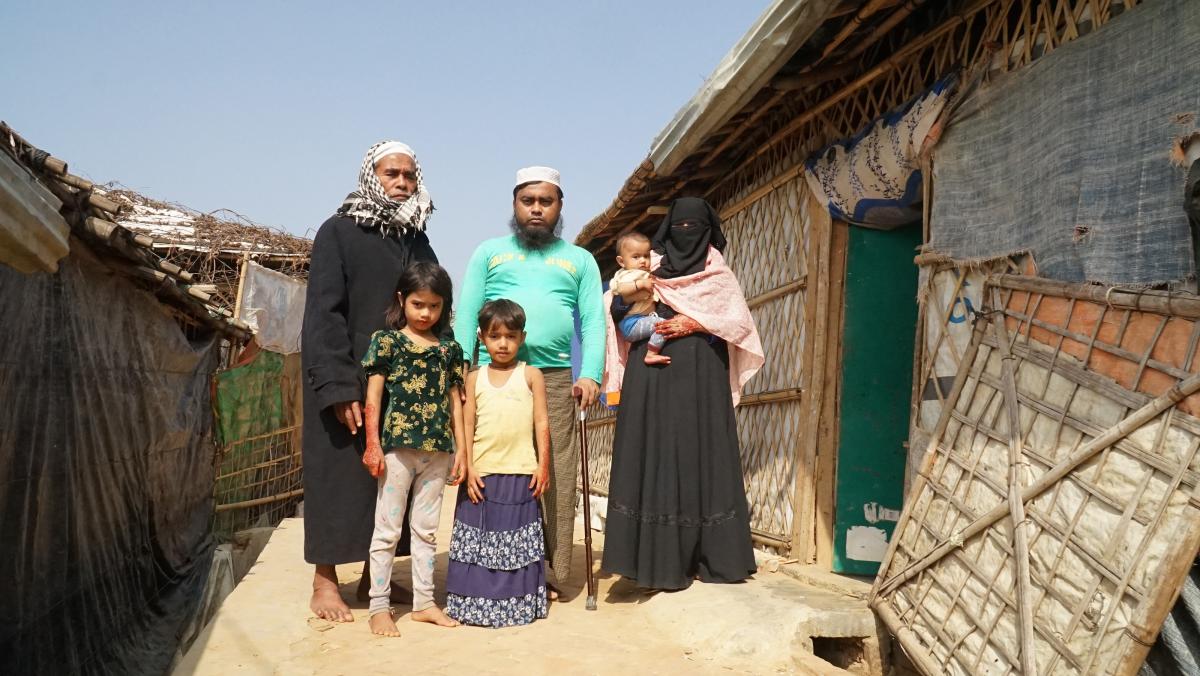Since fleeing deadly violence in Myanmar in August 2017, nearly 1 million Rohingya refugees remain completely aid dependent in neighbouring Bangladesh. Sazida is one of them.
Like many people who were forced to flee their homes during the military crackdown in Myanmar 6 years ago, Sazida’s family was torn apart. Read on to get to know her story and how EU humanitarian aid assisted her when she needed it the most.
© Danish Refugee Council, 2023.
Travelling with her husband and her baby daughter for 4 days to reach Bangladesh’s southernmost province of Cox’s Bazar, she lost the rest of the family in the big crowd moving in the same direction to seek refuge.
Since the relocation to Bangladesh, Sazida gave birth to 2 more children and life was getting more complicated.
In early 2021, when Sazida’s family was already struggling to survive by themselves, her husband Rafik was hit by a car while going to the market. His leg was fractured and he couldn’t walk.
“The entire sky dropped on my head when this happened.” Sazida explained.
This accident not only affected Rafik, but also the whole family.
“It was challenging collecting aid from the distribution centre located far away from our shelter, taking care of the children, cooking, fetching water, carrying out everyday household chores while also helping my husband who requires constant care, all by myself”, says Sazida.
Fortunately, Sazida was aware that she could seek assistance to help with her husband’s conditions.
“Sazida took me to Chittagong district for treatment with the doctor’s referral”, Rafik recalls. “I could not walk for a few months and feared not being able to walk again. After 6 months, an NGO gave me a wheelchair, and I gradually started to move with it.”
With support from DRC and the Norwegian Refugee Council (NRC) staff, Rafik received the care he needed.
Although Rafik is now in good hands, he is still not fully recovered.
It was still hard for Sazida to fulfil all her new responsibilities, also considering the overall security in camps. The situation has significantly deteriorated in recent months, particularly for women who are more and more at risk of being harassed, attacked, or exposed to extorsion.
Helping the family reunite
Sazida recalled hearing the news of their lost relatives staying in other camps a few years ago but she could not find any way to reunite with them immediately due to movement restrictions within the camps.
Reuniting with her family became more than just a dream when she applied for a relocation permission to move closer to her in-laws last year. The EU-funded consortium supported Sazida so that she could be reunited and feel safe and secure near her relatives.
“We tried our best to assist the family to relocate,” said DRC protection officer Rawnakul Alam. “Together with NRC, we worked to complete the application and permission procedure.”
Now, Sazida and her family finally moved to her in-laws’ camp where she can count on their support.
Rafik no longer requires a wheelchair. Instead, he now walks using a stick and is more comfortable than before.
Sazida doesn’t need to go collect water or aid packages because her brother-in-law assists her with the heavy lifting. Her father-in-law watches her daughters while she is busy with chores.
“I no longer have stress,” Sazida said with a smile. “My girls are happy to be with their grandparents, and it brings me utmost joy.”
Thanks to EU humanitarian funding, Danish Refugee Council (DRC), in partnership with Norwegian Refugee Council (NRC), International Rescue Committee (IRC) and Humanity & Inclusion (HI) offer support to refugees such as Sazida. The aim is to address their urgent needs as well as those of their host communities, including contributing to increasing their protection.


